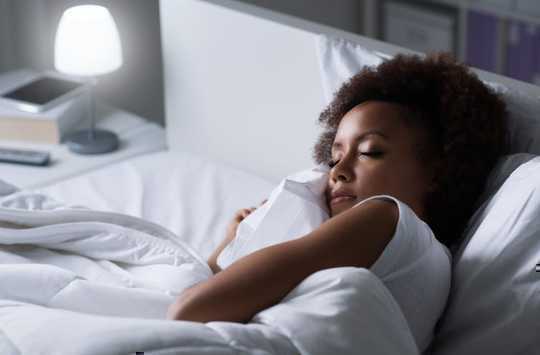 Spending more time in bed and letting your body’s natural rhythms take over could be good for your health. Stock-Asso/Shutterstock.com
Spending more time in bed and letting your body’s natural rhythms take over could be good for your health. Stock-Asso/Shutterstock.com
The COVID-19 pandemic is disrupting daily routines around the world. Overwhelmed hospitals, desolate schools, ghostly towns and self-isolation echo a campy horror flick, but an all too real one.
Companies are laying people off by the thousands, the service industry is teetering on the brink of collapse, and socialist ideas suddenly don’t sound so bad to an average citizen . According to a recent poll by the University of Southern California, around 40% of individuals feel anxiety about the pandemic, and more than half have been avoiding some or all other people.
As a psychologist who aims to understand the role of sleep in what makes us tick, I focus mostly on how the sleep-wake cycle impacts our day-to-day social lives. Which makes me think of one thing thing we can do, especially for those of us at home. That is to sleep.
 Turning off alarm clocks and phones can allow your body to sleep according to its natural circadian rhythm. Gorondenkof/Shutterstock.com
Turning off alarm clocks and phones can allow your body to sleep according to its natural circadian rhythm. Gorondenkof/Shutterstock.com
Get The Latest By Email
Sleep at the dawn of COVID-19
This reversible state of disengagement with the world is one of the most important protective and restorative factors in human life. Slumber is essential for thinking clearly and staying upbeat during any time . Moreover, sleep is indispensable for maintaining immunological function, which is key to preventing and recovering from infectious diseases like COVID-19 . Loosing sleep makes people more susceptible to viral infections, and it undermines recovery from the common cold as well as more serious conditions . For this lethally stealthy bug, it may be even more important.
Unfortunately, it is exactly during times of social uncertainty and anxiety, when we need sleep the most, that it is most disrupted. Anxiety over the future and fear for health of loved ones threaten calm nights and impinge on sleep by increasing hyper-arousal and rumination – reactions known to intensify insomnia . Isolation from regular social rhythms and natural light will further mess with our body clock, confusing us about when we are supposed to feel tired and when to perk up.
Most Americans are not meeting this crisis well-rested. Research we have conducted over the past few years using CDC data on hundreds of thousands of Americans suggests that the smart phone age has led to substantial deterioration in both duration and quality of sleep. A case in point, a recent analysis that my team conducted suggests that over the past five years, millions more Americans report sleeping problems.
And the psychological toll is not too far away, but it will register most forcefully after the infection rates start to decline. Once the pandemic peaks and the physical damage to bodies start to wane, only then will the full consequences of this pandemic on our well-being be apparent. Inevitable increases in psychological complaints, suicide, and substance use disorders need to be anticipated and mitigated now. Recall that after the “Great Recession” of 2008-09 there were millions more people with health and psychological problems in both U.S. and Europe.
So how to go about protecting our sleep? Besides the threats and challenges, this time actually provides hidden opportunities as well. When is the last time that the majority of any population stayed at home for days, often without need to use alarm clocks?!
Besides connecting with those closest to us, many of us can sleep in and organize lives in ways that suit our biological ticker. Larks can go to bed earlier and owls can snooze in. Families can synchronize their meal and play routines in new ways, honoring the time of their internal clock (what chrono-biologists call the ‘circadian’ phase’). For most of our history we slept with one another when our bodies told us too, not by ourselves and only when work allowed. This may be an unprecedented opportunity to embrace a basic human need to switch off on a regular basis, helping human bodies fight the wars only those bodies know how.
About The Author
Zlatan Krizan, Professor of Psychology, Iowa State University
This article is republished from The Conversation under a Creative Commons license. Read the original article.
books_health







